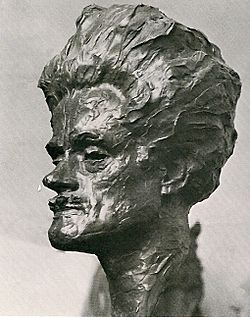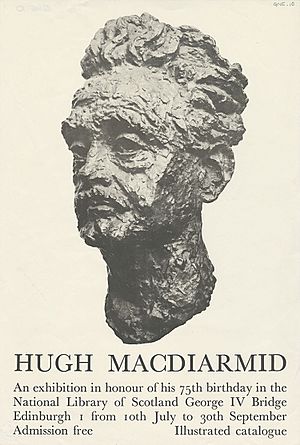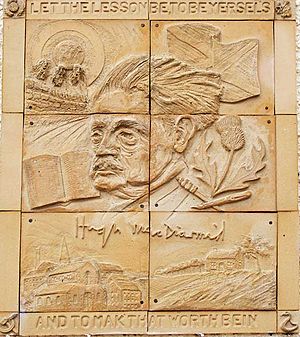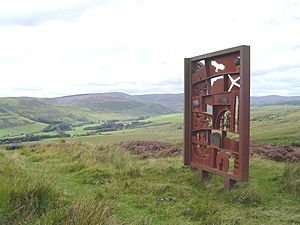Hugh MacDiarmid facts for kids
Quick facts for kids
Hugh MacDiarmid
|
|
|---|---|

A bust of MacDiarmid sculpted in 1927
|
|
| Born | Christopher Murray Grieve 11 August 1892 Langholm, Dumfriesshire, Scotland |
| Died | 9 September 1978 (aged 86) Edinburgh, Scotland |
| Occupation | Poet |
| Nationality | Scottish |
| Literary movement | Scottish Renaissance |
Christopher Murray Grieve (born August 11, 1892 – died September 9, 1978) was a famous Scottish writer. He is better known by his pen name, Hugh MacDiarmid. A pen name is a fake name a writer uses instead of their real one.
MacDiarmid was a poet, journalist, and political thinker. He was a main leader of the Scottish Renaissance. This was a time when Scottish art and culture became very important again. He had a big impact on Scottish culture and politics for many years.
He helped start the National Party of Scotland in 1928. This party wanted Scotland to be independent. He later joined the Communist Party. He believed in Scottish independence and also in communism. These ideas sometimes caused him trouble with political groups.
MacDiarmid first wrote in English. But he is most famous for using "synthetic Scots." This was a special version of the Scots language that he created for his poems. Later in his life, he wrote more in English. Sometimes he used a "synthetic English" with many scientific words.
He was born in Langholm, a town in Scotland. His father was a postman. MacDiarmid went to Langholm Academy. He worked as a journalist in Wales before World War I. He joined the army during the war. He served in Greece and France. His time in the army helped shape his ideas.
After the war, he kept working as a journalist. He published his first book, Annals of the Five Senses, in 1923. He moved to the Shetland island of Whalsay in 1933. He continued to write poetry and essays there. Hugh MacDiarmid died in 1978 when he was 86 years old.
Contents
About Hugh MacDiarmid
Early Life and Education
Christopher Murray Grieve was born in Langholm in 1892. His family lived above the town library. This meant he could read many books from a young age. He went to Langholm Academy. Later, he studied in Edinburgh. There, a teacher named George Ogilvie helped him discover a magazine called The New Age.
In 1911, Grieve started working as a journalist. His first article was published in The New Age. He moved to Wales to work as a reporter. Later, he returned to Scotland. He worked for a newspaper near Glasgow. Here, he learned about important Scottish socialists like John Maclean.
Serving in World War I
In July 1915, Grieve joined the army. He served in the Royal Army Medical Corps. This was during the First World War. He was sent to Greece and France. After the war, he got married. He then went back to being a journalist.
Writing in Scotland
MacDiarmid's first book was Annals of the Five Senses. It had both prose and poetry in English. It came out in 1923. Around this time, he started writing in Scots. He wrote many books of poems in this language. One of his long poems is very important in Scottish literature. He also published books with poems in both English and Scots.
Living in Shetland
From 1933 to 1942, MacDiarmid lived on the island of Whalsay in Shetland. He often went out on fishing boats with local fishermen. He even asked them to leave him on an empty island overnight. People on the island say he asked about local words. Some islanders even made up words that didn't exist! He wrote some of his best poetry while living there.
The house where he lived on Whalsay is now a simple camping spot. It is called the Grieves House böd.
Returning to Mainland Scotland
In 1942, MacDiarmid moved to Glasgow for war work. He lived there until 1949. Then he moved to a cottage near Biggar, South Lanarkshire. This was his last home. He died in Edinburgh when he was 86 years old.
His Political Ideas
Hugh MacDiarmid believed strongly in two things. He supported communism and Scottish nationalism. Communism is a political idea about how society should be run. Scottish nationalism is the idea that Scotland should be an independent country. These two beliefs often caused disagreements with others.
He helped create the National Party of Scotland in 1928. This party was the start of the modern Scottish National Party. He was also a member of the Communist Party of Great Britain. He was even removed from both parties at different times. This was because he was a Scottish Nationalist to the Communists. And he was a Communist to the Nationalists!
MacDiarmid believed that an independent Scotland could also be a socialist country. He saw no problem with these ideas together. He ran for election several times. He stood for the Scottish National Party in 1945 and 1950. He also ran for the Communist Party in 1964.
During World War II, British intelligence watched MacDiarmid. They kept an eye on him for many years. Some letters found later showed his complex views during the war. He thought that a German invasion of Britain might help Scotland in the long run. He believed the British government was a bigger problem than the Axis powers. He also thought that if the British and French won the war, it would be harder to get rid of them.
Some people thought he had supported fascism early in his life. Fascism is a type of government with a strong leader and no opposition. But his daughter-in-law said he explored many different ideas throughout his life.
His Unique Writing Style
In the 1920s, MacDiarmid wrote much of his work in "Synthetic Scots." This was a special version of the Scots language. He created it by combining words from different local dialects. He used dictionaries and other sources to build this language.
After the 1930s, he started writing more in English. Most of his later poems are in English. He wanted his poetry to include all kinds of knowledge. He often used parts of other texts in his poems. This is called "found poetry." For example, he used a dictionary for poems like 'On a Raised Beach'. He also used long sections of prose in some poems.
Some people accused him of copying others' work. But MacDiarmid said, "The greater the plagiarism the greater the work of art." His later poetry tried to show a world without God. It aimed to include facts that could be proven by science. A writer named Michael Schmidt said MacDiarmid changed Scottish poetry forever. He also had a big impact on English literature.
MacDiarmid also wrote non-fiction books. These included Scottish Eccentrics and his life story, Lucky Poet. He also translated poems from Scottish Gaelic. These translations were liked by people who spoke Gaelic.
His Family Life
Hugh MacDiarmid had a daughter named Christine and a son named Walter with his first wife, Peggy Skinner. He had another son, Michael, with his second wife, Valda Trevlyn. Michael later became a leader in the Scottish National Party.
Places to Visit
MacDiarmid grew up in Langholm, Scotland. There is a monument there in his honor. It looks like a big open book. It shows pictures from his writings.
He also lived in Montrose for a while. He worked for the local newspaper there.
His home on the island of Whalsay in Shetland is now a simple place for visitors to stay.
Brownsbank Cottage, near Biggar, South Lanarkshire, was his home from 1952 until he died. It has been restored and can be visited.
Hugh MacDiarmid is remembered in Makars' Court in Edinburgh. This is a special place outside the Writers' Museum. It honors famous Scottish writers.
Art and Film About MacDiarmid
A famous sculptor named Alan Thornhill made a bronze bust of Hugh MacDiarmid. This sculpture is now in the National Portrait Gallery in London.
A filmmaker named Margaret Tait made a film about him in 1964. It was called Hugh MacDiarmid, A Portrait. The film shows MacDiarmid reading some of his poems. He also supported Margaret Tait's work as a filmmaker and poet.
See also
 In Spanish: Hugh MacDiarmid para niños
In Spanish: Hugh MacDiarmid para niños
 | Delilah Pierce |
 | Gordon Parks |
 | Augusta Savage |
 | Charles Ethan Porter |




